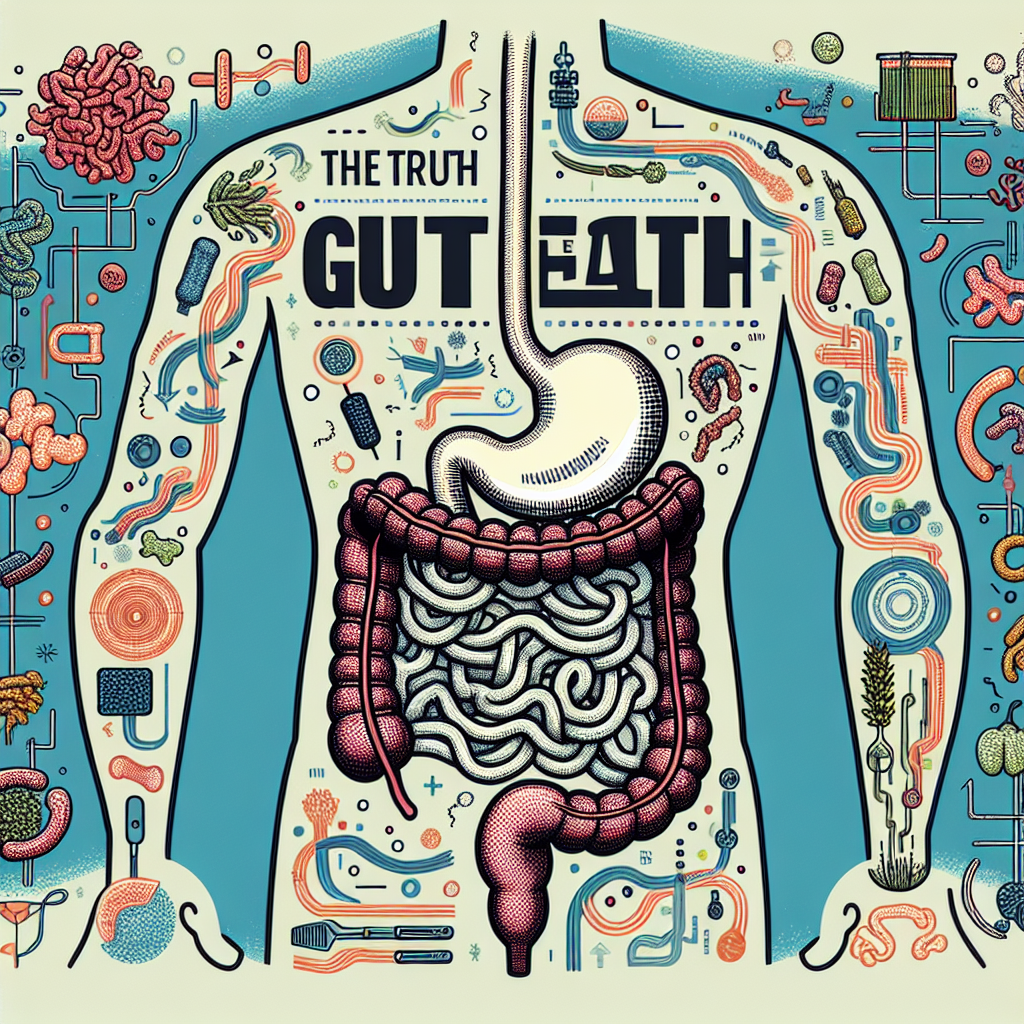The Truth About Gut Health

Discover the truth about gut health now! Uncover the secrets to a healthier, happier life by understanding your gut. Click here to start your journey towards vibrant vitality.
Unveiling the Truth: The Impact of Gut Health on Overall Wellbeing
The truth about gut health is a topic that has been gaining significant attention in the health and wellness community. It is a subject that is often shrouded in mystery and misconceptions, but as more research is conducted, the profound impact of gut health on overall wellbeing is becoming increasingly clear.
The gut, also known as the digestive tract, is a complex system that plays a crucial role in the body’s overall health. It is responsible for breaking down food, absorbing nutrients, and eliminating waste. However, the gut does more than just process food. It is also home to trillions of bacteria, known as the gut microbiota, which have a profound impact on our health.
The gut microbiota is a diverse community of bacteria that coexist in our digestive tract. These bacteria play a vital role in our health by aiding digestion, producing essential vitamins, and protecting against harmful pathogens. However, the balance of these bacteria can be easily disrupted by factors such as diet, stress, lack of sleep, and medication. When this balance is disrupted, it can lead to a condition known as dysbiosis, which has been linked to a range of health problems, including obesity, diabetes, heart disease, and even mental health disorders.
The link between gut health and mental health is a particularly fascinating area of research. The gut and the brain are connected through a complex network known as the gut-brain axis, which allows them to communicate with each other. This means that changes in the gut microbiota can influence brain function and behavior. For example, research has shown that people with certain mental health disorders, such as depression and anxiety, often have a different gut microbiota composition compared to healthy individuals. This suggests that improving gut health could potentially help manage these conditions.
Moreover, gut health also plays a crucial role in the immune system. Around 70% of the immune system is located in the gut, making it a key player in defending the body against disease. A healthy gut microbiota can help to regulate the immune response and prevent overreaction, which can lead to inflammation and autoimmune diseases.
Despite the growing evidence of the importance of gut health, it is often overlooked in discussions about overall wellbeing. Many people are unaware of the impact that their gut health can have on their physical and mental health. However, the good news is that there are many ways to improve gut health. A diet rich in fiber, fruits, vegetables, and fermented foods can help to promote a healthy gut microbiota. Regular exercise, adequate sleep, and stress management techniques can also contribute to a healthy gut.
In conclusion, the truth about gut health is that it plays a pivotal role in our overall wellbeing. It is not just about digestion, but also about mental health, immune function, and disease prevention. As more research is conducted, it is becoming increasingly clear that maintaining a healthy gut is essential for overall health. Therefore, it is important to take steps to improve gut health and to consider it as an integral part of a holistic approach to wellbeing.
The Hidden Truth: How Gut Health Influences Mental Health

The truth about gut health is a topic that has been gaining significant attention in recent years. It is a subject that is not only fascinating but also has profound implications for our overall health and well-being. One of the most intriguing aspects of gut health is its influence on mental health, a connection that is often overlooked. This hidden truth is gradually coming to light, revealing a complex interplay between our gut and our brain that has far-reaching implications for our mental well-being.
The gut, often referred to as the ‘second brain’, is home to trillions of bacteria collectively known as the gut microbiome. These bacteria play a crucial role in our health, influencing everything from our immune system to our metabolism. However, their influence does not stop there. Emerging research suggests that our gut microbiome also has a significant impact on our mental health.
The gut and the brain are connected through a complex network known as the gut-brain axis. This network allows for constant communication between the gut and the brain, with signals being sent in both directions. This means that what happens in our gut can directly affect our brain and vice versa. For instance, the gut microbiome produces various neurotransmitters, chemicals that transmit signals in the brain. These include serotonin, a neurotransmitter that plays a key role in regulating mood, and GABA, which helps control feelings of fear and anxiety.
The gut-brain axis also involves the immune system, which can be influenced by the state of our gut health. An imbalance in the gut microbiome, known as dysbiosis, can trigger an inflammatory response. This inflammation can then affect the brain, potentially leading to mental health issues such as depression and anxiety.
Moreover, the gut microbiome can influence the production of stress hormones. Studies have shown that individuals with certain types of gut bacteria have a heightened response to stress, which can exacerbate mental health problems. On the other hand, a healthy gut microbiome can help to regulate the body’s stress response, potentially reducing the risk of mental health issues.
The link between gut health and mental health is further supported by numerous studies. For example, research has shown that individuals with mental health disorders often have an altered gut microbiome compared to healthy individuals. Additionally, certain probiotics, which are beneficial bacteria that can improve gut health, have been found to have potential antidepressant and anti-anxiety effects.
However, while the connection between gut health and mental health is compelling, it is important to note that much of the research in this area is still in its early stages. Many questions remain unanswered, and more research is needed to fully understand the complex relationship between the gut and the brain.
In conclusion, the truth about gut health is that it plays a far more significant role in our mental well-being than we may have previously realized. The gut-brain axis provides a fascinating insight into how our physical health can influence our mental health, and vice versa. As we continue to uncover the hidden truths about gut health, we may find new ways to improve our mental well-being and overall health.
The Undeniable Truth: The Role of Gut Health in Immune System Functioning
The truth about gut health is a topic that has been gaining significant attention in the health and wellness community. It is a subject that is often overlooked, yet it plays a crucial role in our overall health and well-being. The undeniable truth is that gut health is intricately linked to the functioning of our immune system.
The human gut, also known as the gastrointestinal tract, is a complex system that plays a vital role in digestion, nutrient absorption, and waste elimination. However, its function extends beyond these basic processes. The gut is home to trillions of microorganisms, collectively known as the gut microbiota. These microorganisms, which include bacteria, viruses, and fungi, have a symbiotic relationship with our bodies. They help us digest food, produce essential vitamins, and protect us from harmful pathogens.
In recent years, scientific research has shed light on the profound influence of the gut microbiota on our immune system. The gut microbiota and the immune system communicate with each other, influencing each other’s functions. This interaction is so significant that some scientists refer to the gut as the body’s “second brain.”
The immune system, our body’s defense mechanism against disease and infection, relies heavily on the gut microbiota. A healthy and diverse gut microbiota strengthens the immune system, enabling it to respond effectively to pathogens and prevent disease. On the other hand, an imbalance in the gut microbiota, known as dysbiosis, can weaken the immune system, making us more susceptible to infections and diseases.
Dysbiosis can result from various factors, including poor diet, stress, lack of sleep, and overuse of antibiotics. These factors can reduce the diversity of the gut microbiota, allowing harmful bacteria to outnumber beneficial ones. This imbalance can trigger an inflammatory response, which, if chronic, can lead to various health problems, including autoimmune diseases, allergies, and even mental health disorders.
The good news is that we can take steps to improve our gut health and, by extension, our immune system. A diet rich in fiber, fruits, vegetables, and fermented foods can promote a healthy and diverse gut microbiota. Regular exercise, adequate sleep, and stress management can also contribute to gut health. Moreover, probiotics, which are beneficial bacteria, can help restore the balance of the gut microbiota, especially after antibiotic use.
In conclusion, the undeniable truth is that gut health plays a pivotal role in immune system functioning. The gut microbiota and the immune system are interconnected, influencing each other’s functions. A healthy and diverse gut microbiota strengthens the immune system, while dysbiosis can weaken it. Therefore, maintaining gut health is essential for a robust immune system and overall well-being. As we continue to unravel the complexities of the gut microbiota, we can look forward to more insights into how we can harness its potential for better health.